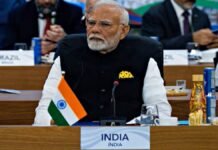
Key points
- Zero tolerance: Modi urged SCO states to adopt a common framework against terror financing and radicalisation, saying there can be no “double standards” on terrorism.
- Pakistan subtext: With PM Shehbaz Sharif present, Modi referenced the Pahalgam attack and cross‑border terrorism without directly naming Pakistan.
- Tianjin Declaration: SCO leaders condemned the April 22 Pahalgam attack and said perpetrators, organisers, and sponsors must be brought to justice.
- India’s 3 pillars: Security, connectivity, and opportunity were outlined as India’s SCO approach, alongside praise for RATS cooperation.
- Global context: Modi cautioned against unilateral and protectionist tendencies, while also advancing regional economic and cultural ties.
Tianjin China: Prime Minister Narendra Modi used the Tianjin SCO summit to press for a united, zero‑tolerance stance on terrorism, implicitly calling out Pakistan over cross‑border attacks while urging member states to reject “double standards” and intensify action against terror financing and radicalisation. He also signalled resistance to unilateral, protectionist, and hegemonic approaches in global affairs, framing the SCO’s mission around security, connectivity, and opportunity.
Modi’s message at SCO
Modi called terrorism the gravest threat to regional peace and a challenge to all humanity, urging the bloc to clearly state that double standards on terrorism are unacceptable and to build a comprehensive framework to choke financing and curb radicalisation. He linked India’s policy to three pillars security, connectivity, and opportunity underscoring how SCO’s Regional Anti‑Terrorist Structure can be leveraged to deepen operational cooperation.
Pahalgam attack reference
Referring to the April 22 Pahalgam terror attack, Modi thanked friendly countries for support and said India has borne the brunt of terrorism for four decades, with countless families devastated. The Tianjin Declaration mirrored this emphasis, condemning the attack and insisting that perpetrators, organisers, and sponsors be held accountable, marking a notable convergence within a diverse bloc.
Subtext on Pakistan
While not naming Pakistan, Modi’s remarks on cross‑border terrorism and “no double standards” landed with added force given Sharif’s presence in the hall, reviving India’s longstanding demand for collective pressure on state‑enabled militancy. Coverage from multiple outlets highlighted the pointed nature of the appeal and its timing amid heightened India‑Pakistan tensions in the wake of Pahalgam.
India’s broader stance
Beyond counter‑terrorism, Modi cautioned against protectionist, unilateral, and hegemonic approaches, aligning India’s position with open, rules‑based cooperation and enhanced regional trade and connectivity. The summit setting also enabled diplomatic engagements with leaders including Xi and Putin, with live reports noting the effort to stabilise ties and expand pragmatic cooperation under the SCO umbrella.
What the declaration says
The Tianjin Declaration’s explicit condemnation of the Pahalgam attack and its call to bring perpetrators, organisers, and sponsors to justice echoed India’s priorities within the SCO, even as it avoided naming any state. This language, adopted by members with diverse alignments, underscores a shared rhetorical front on terrorism that New Delhi hopes to translate into firmer operational outcomes.






















































